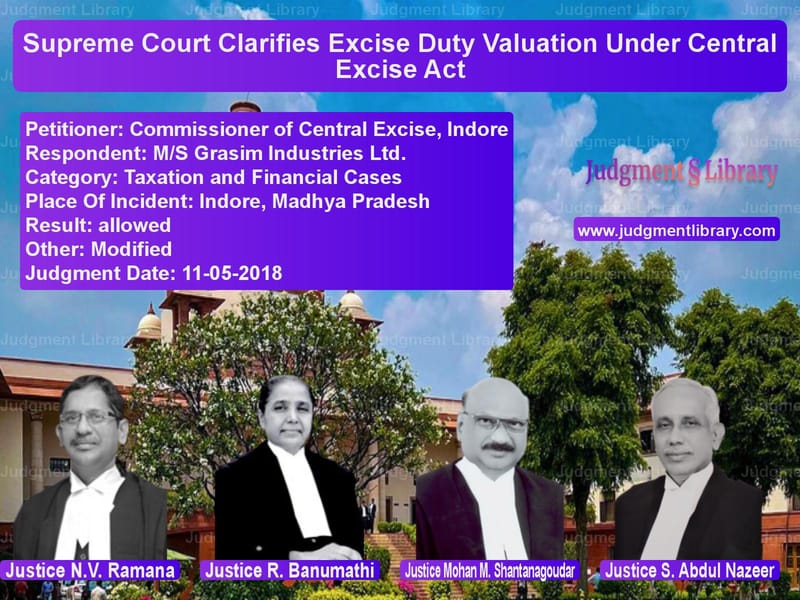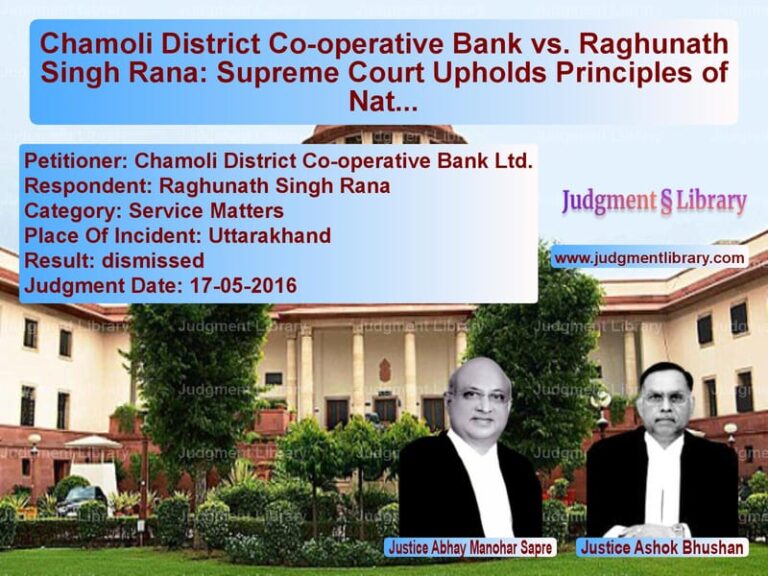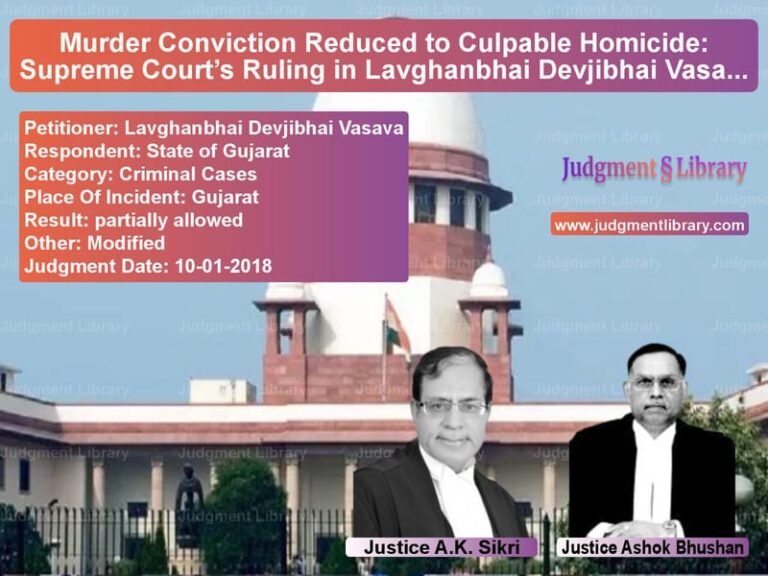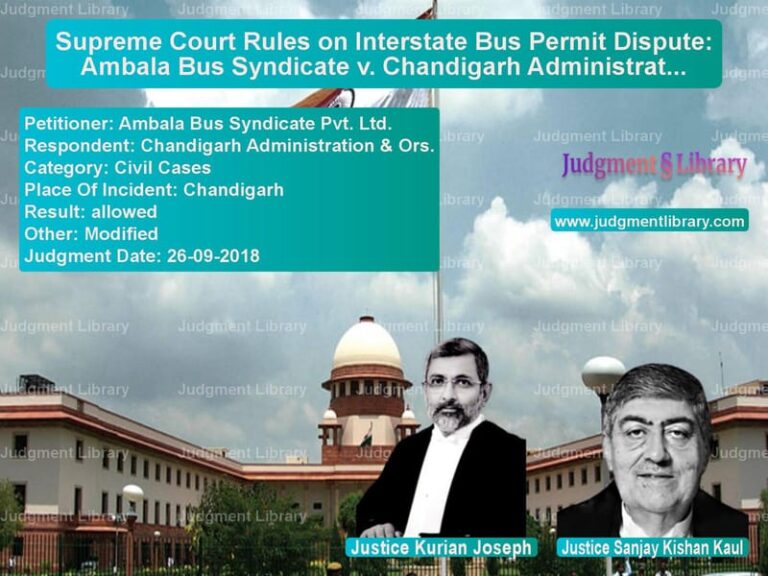Supreme Court Clarifies Excise Duty Valuation Under Central Excise Act
The Supreme Court of India, in its landmark judgment dated May 11, 2018, in Commissioner of Central Excise, Indore vs. M/S Grasim Industries Ltd., examined the valuation of excisable goods under the Central Excise Act, 1944. The decision revolved around whether additional charges like packing, rental, wear and tear, and service fees should be included in the assessable value for excise duty purposes.
This ruling provides a detailed clarification on the nature and scope of transaction value under the Central Excise Act and settles conflicts between earlier decisions such as Union of India vs. Bombay Tyre International Ltd. and Commissioner of Central Excise, Pondicherry vs. Acer India Ltd.
Case Background
The respondent, M/S Grasim Industries Ltd., is a manufacturer of industrial gases, liquid chlorine, and other allied products. The company supplies these products in tonners, cylinders, HDPE bags, and other containers. In some instances, these containers are rented out to customers, while in others, customers provide their own containers.
The company imposed various charges on its customers under the following heads:
- Packing charges
- Wear and tear charges
- Facility charges
- Service charges
- Delivery and collection charges
- Rental charges
- Repair and testing charges
The Commissioner of Central Excise argued that these charges should be included in the assessable value for excise duty computation. However, the respondents contended that these charges were ancillary and should not be considered part of the transaction value.
Legal Issues Considered
- Whether additional charges such as packing, rental, and testing fees should be included in the excisable value.
- How the concept of transaction value differs from the previously defined normal price.
- The validity of earlier Supreme Court rulings regarding excise duty valuation.
- The relationship between excise duty levy and the statutory measure of valuation.
Arguments of the Petitioner
The Commissioner of Central Excise presented the following arguments:
- Excise duty should be levied on the total amount payable by the buyer, including all additional charges.
- The amendment to Section 4 in 2000 widened the definition of transaction value, making it more inclusive.
- All amounts that a buyer is liable to pay as a condition of sale must be part of the excisable value.
- Excluding these charges would result in revenue loss and allow manufacturers to manipulate tax liabilities.
Arguments of the Respondent
Grasim Industries Ltd. and other respondents countered:
- Excise duty should be levied only on the manufacturing cost plus manufacturing profit.
- Additional charges were related to services and not manufacturing costs.
- The Supreme Court’s ruling in Acer India Ltd. supported their view that non-manufacturing charges should be excluded.
- The amendment to Section 4 should not be interpreted as expanding the tax base beyond manufacturing expenses.
Supreme Court’s Observations
The Supreme Court analyzed the amendments to Section 4 and emphasized:
“Excise duty is a levy on manufacture, but the measure of tax can be determined based on transaction value, which includes additional charges if they are conditions of sale.”
The Court clarified that transaction value is not restricted to the manufacturing cost but can include:
- Ancillary expenses that contribute to the value of the product.
- Charges that make the product suitable for sale.
- Post-manufacturing costs linked to the trade transaction.
The Court further ruled:
“The measure of the levy must not be confused with the nature thereof, though there must be some nexus between the two.”
Final Judgment
The Supreme Court ruled in favor of the tax authorities, holding that:
- All amounts charged to the buyer, including packing, rental, and testing fees, are part of the transaction value.
- Excise duty should be calculated based on the total amount payable by the buyer.
- The decision in Bombay Tyre International Ltd. correctly interpreted excise duty valuation.
- The revised definition of transaction value under the 2000 amendment aligns with the fundamental principles of excise duty.
The Court concluded:
“The measure of the levy contemplated in Section 4 of the Act will not be controlled by the nature of the levy. So long a reasonable nexus is discernible between the measure and the nature of the levy, both Section 3 and 4 would operate in their respective fields.”
Impact of the Judgment
- Manufacturers can no longer exclude additional charges from excise duty calculations.
- The decision brings uniformity in excise duty valuation and prevents tax evasion.
- It sets a clear precedent on the interpretation of transaction value under the Central Excise Act.
- Companies must restructure their invoicing and pricing strategies to comply with this ruling.
This ruling ensures clarity and consistency in excise duty valuation, reinforcing the principle that transaction value encompasses all charges directly linked to the sale of excisable goods.
Petitioner Name: Commissioner of Central Excise, Indore.Respondent Name: M/S Grasim Industries Ltd..Judgment By: Justice Ranjan Gogoi, Justice N.V. Ramana, Justice R. Banumathi, Justice Mohan M. Shantanagoudar, Justice S. Abdul Nazeer.Place Of Incident: Indore, Madhya Pradesh.Judgment Date: 11-05-2018.
Don’t miss out on the full details! Download the complete judgment in PDF format below and gain valuable insights instantly!
Download Judgment: Commissioner of Cent vs MS Grasim Industrie Supreme Court of India Judgment Dated 11-05-2018.pdf
Direct Downlaod Judgment: Direct downlaod this Judgment
See all petitions in Income Tax Disputes
See all petitions in GST Law
See all petitions in Tax Evasion Cases
See all petitions in Judgment by Ranjan Gogoi
See all petitions in Judgment by N.V. Ramana
See all petitions in Judgment by R. Banumathi
See all petitions in Judgment by Mohan M. Shantanagoudar
See all petitions in Judgment by S. Abdul Nazeer
See all petitions in allowed
See all petitions in Modified
See all petitions in supreme court of India judgments May 2018
See all petitions in 2018 judgments
See all posts in Taxation and Financial Cases Category
See all allowed petitions in Taxation and Financial Cases Category
See all Dismissed petitions in Taxation and Financial Cases Category
See all partially allowed petitions in Taxation and Financial Cases Category







